Chef Vikas Khanna: Feed, pray, love in a pandemic
Khanna has opened a sit-down restaurant at a posh Dubai resort to restart the meter for the pandemic-hit F&B industry


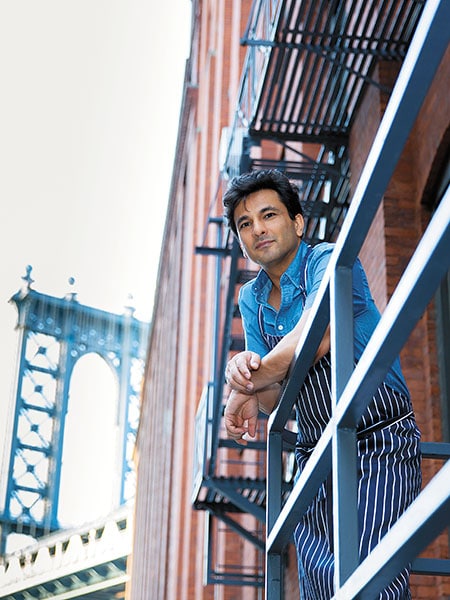 Chef Vikas Khanna at his test kitchen in Brooklyn, New York. From his Manhattan apartment, where he has been confined since March 29, Khanna has collaborated remotely for the opening of a new restaurant in Dubai
Chef Vikas Khanna at his test kitchen in Brooklyn, New York. From his Manhattan apartment, where he has been confined since March 29, Khanna has collaborated remotely for the opening of a new restaurant in Dubai
Photo Courtesy: Team Chef Vikas Khanna[br] It’s 1 am in New York when we catch up with Vikas Khanna over a phone call. Are you sure this is a good time to talk, we ask. “Why, do I sound sleepy?” he shoots back. He doesn’t. And he isn’t going to sleep anytime soon, he tells us.
Sprawled in front of him are layouts of a movie Khanna has completed with Shabana Azmi—it is in post-production, and likely to be released next year. Once those are vetted, he will start shooting photos for his upcoming cookbook. “I have to click six more images, but looks like I’ll be able to complete only three tonight,” he says. Interspersed are calls with India’s National Disaster Response Force (NDRF), a government agency he is collaborating with to feed the pandemic-hit in the country. “With so much going on, I have no fixed sleeping hours. I keep taking short naps through the day,” he adds.
If his day wasn’t chock-a-block enough, Khanna, 48, opened a new restaurant in Dubai on August 14, with a big, bold, contrarian call of launching a sit-down eatery at a time when the F&B industry is scraping the bottom of the barrel to survive. The months-long lockdown has eroded cash reserves for restaurants that operate on razor-thin margins, and distancing norms post-opening have forced them to reduce covers and footfalls.
The Federation of Associations in Indian Tourism and Hospitality (FAITH), an apex body of tourism and hospitality entities in India, has estimated the sector is at risk of losing ₹15 lakh crore in the wake of the Covid-19 shutdown. Multiple restaurants have downed shutters at Delhi’s Khan Market, among the poshest and most expensive retail spaces in India. In the midst of such an industry-wide crisis, Khanna, in collaboration with JA Resorts and Hotels (with which he also launched Kinara, in Dubai, last September), has opened the doors of Ellora, a casual-dining, seasonal menu restaurant, at a posh resort by the Jabel Ali beach.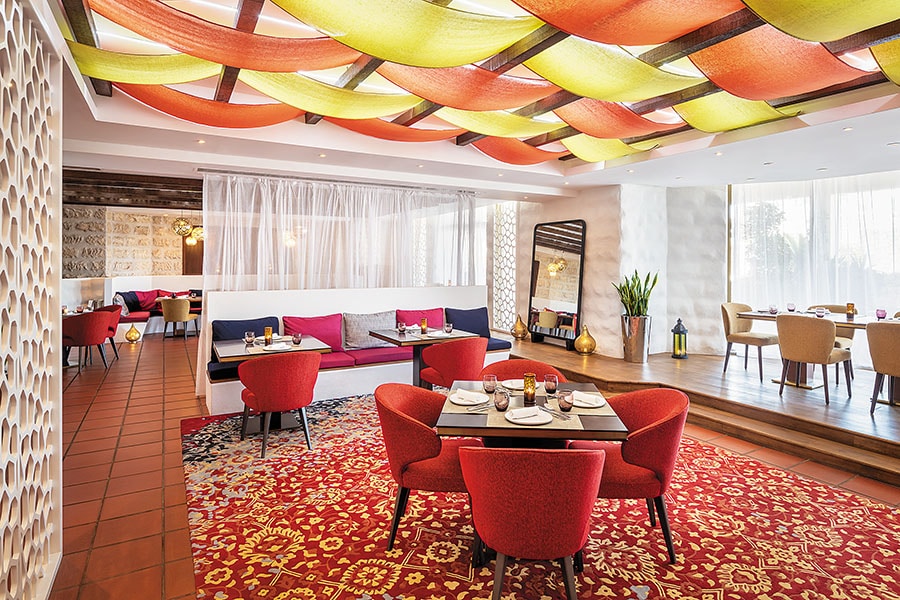 The interiors of Ellora in Dubai set up in keeping with norms of social distancing
The interiors of Ellora in Dubai set up in keeping with norms of social distancing
Image: Ellora By Vikas Khanna At Ja Beach Hotel Ja The Resort[br]But the odds aren’t giving the Michelin-starred chef sleepless nights. “The only way to get the economy back on track is to open projects and create opportunities. If people like us don’t do that, how will the staff take care of their families? It’s okay to talk about staying positive, but I thought the most powerful statement I could make at a time like this was to open a restaurant,” says Khanna, who has also appeared in multiple TV shows, including Masterchef India.
While the name Ellora—chosen by Khanna himself—is meant to represent a beacon of positivity in challenging times, the opening had to navigate multiple roadblocks wrought by the pandemic. The restaurant had to cut down its indoor seating from 80 to 56, food trials had to take place at home kitchens and, most significantly, for the first time, Khanna’s vision had to be executed remotely, with him operating out of his apartment in Manhattan, New York, since March 29. A few runaway successes from Kinara’s menu were borrowed, but most took shape via video calls beginning 8.30 pm Dubai time.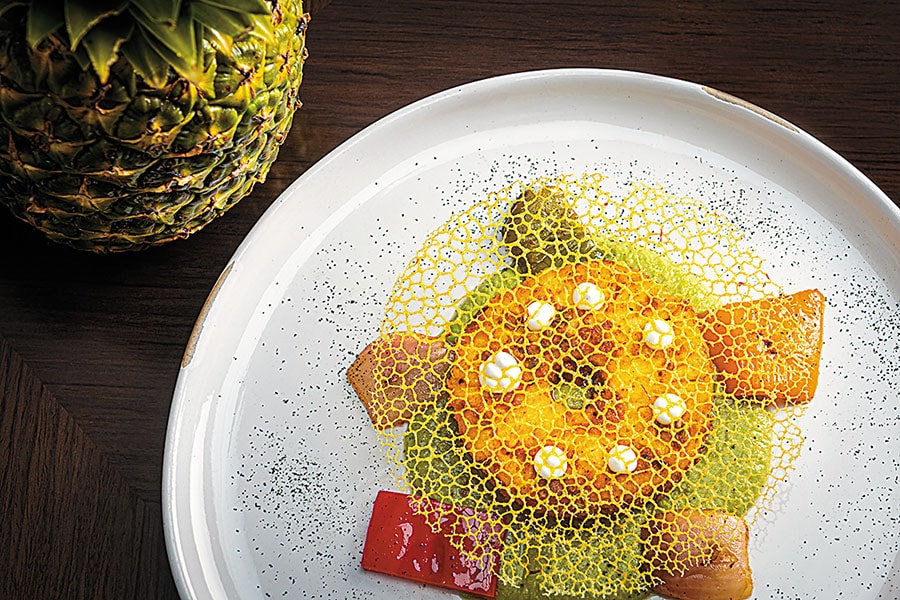 Tandoori pineapple at Ellora
Tandoori pineapple at Ellora
Image: Ellora By Vikas Khanna At Ja Beach Hotel Ja The Resort[br]Says Ashish Kumar, executive chef, Ellora: “I’ve worked with Khanna on Kinara, so I had an idea about the kind of taste profile he looks for, and worked on that. That apart, we had a buzzing WhatsApp group constantly sharing photos, thoughts, concepts that eventually shaped the menu.” Once the basic dish came together, Kumar moved to the professional kitchen for final tastings with a panel from JA Resorts & Hotels, including the general manager and the director. It led to multiple iterations—like a watermelon curry that had to be refined quite a few times—before a dish made it to the final menu. 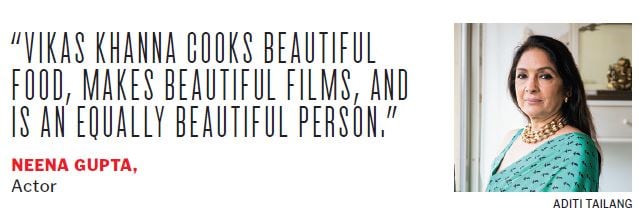
Khanna doesn’t know when he will eventually land up at Ellora, but from 11,000 km afar he has fashioned its philosophy to align with the Covid-normal. “In times like these, casual dining works better than fine dining, which is cost-intensive and needs a lot of labour. The idea is to make the chain more efficient and less staff-oriented it means much more mise en place,” he says. While a typical Vikas Khanna dish would need three counters to assemble, at Ellora he makes do with one and a half. “I have insisted that everything has to be done a la minute, which helps the kitchen run on less staff.” Besides, the pressure on the tandoor, which works on an overload in the kitchens of Indian restaurants, has been distributed among ovens and tawas. “However, and here comes the curse of my Michelin star, I have to meet certain expectations with my dish. My dishes can’t be ‘normal’. That will signify loss of creativity and imagination.”
“Vikas is a born artist,” says mother Bindu Khanna. “He’s never cooked anything simple. That he was different was evident from the creative essays he would write in school. He would never score good marks, but his thoughts were out-of-the-box.” Khanna’s casual-Michelin saffron and almond sheermal, therefore, is prepared with stencilled rolling pins that give it imprints it’s a climb-down from an earlier sheermal that came with a layer and a surprise filling, but is still fancy enough to border on food art. A prawn ghee roast has podi masala sprinkled with a custom-made mould to resemble peacocks reflecting Indian heritage as well as those that roam the JA Beach Hotel, while menaskai is served with an engraved net of pineapple reduction on top. “At his restaurants, you’re not eating food—you feel like you’re eating paintings,” adds Bindu, who lit the first stove at Kinara and at every other business her son has ever launched.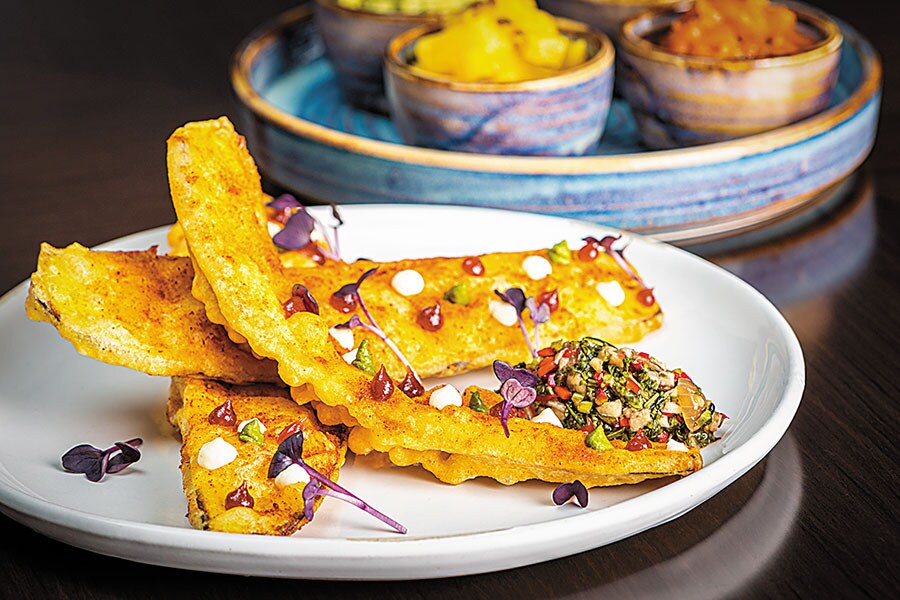 Kele ke bhaji at Ellora
Kele ke bhaji at Ellora
Image: Ellora By Vikas Khanna At Ja Beach Hotel Ja The Resort[br] “Yes we’ve had to reduce the number of tables, and I can’t say confidently that we’ll recover our investments. But we have to create jobs, and if the food is good, I believe we’ll never have an empty table. We can’t escape the fact that our diners need new concepts. That’s how the meter starts again,” says Khanna.
“Opening a restaurant right now is a brave thing to do, but Khanna has obviously made some calculations that you and I haven’t. He’s a household name in Dubai and even non-Indians have seen him in Masterchef,” says Vir Sanghvi, columnist and TV presenter. “When I met him for the first time, he had a Michelin star. Chef Atul Kochhar had described him as a young Rajesh Khanna due to his popular appeal. But what struck me was his humility—he never once pretended to be anything but the boy from Amritsar. Yet, beneath that modesty is a tremendous self-belief. He has a strong drive to do what he wants to and he’s a perfectionist.”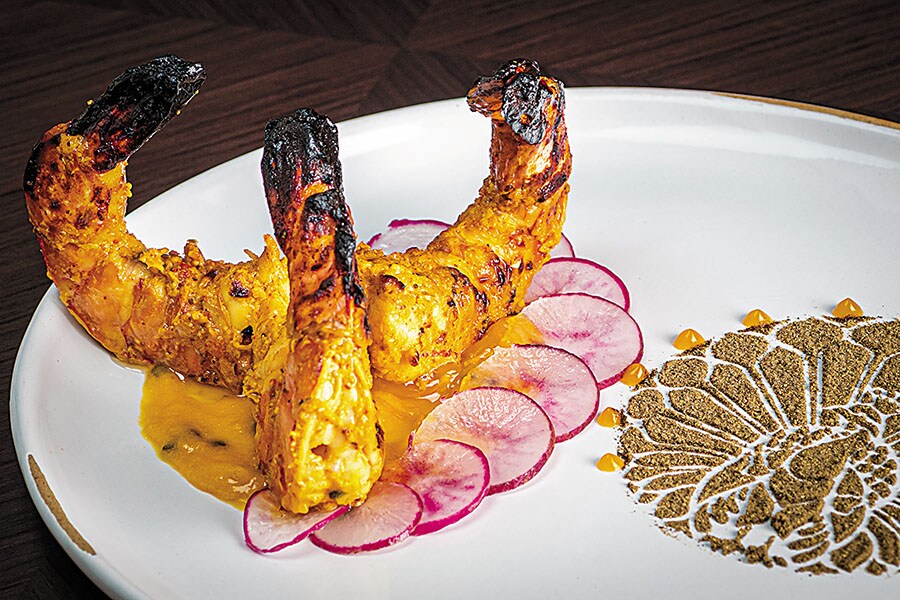 Tandoori lemon prawn at Ellora
Tandoori lemon prawn at Ellora
Image: Ellora By Vikas Khanna At Ja Beach Hotel Ja The Resort[br]The restlessness, and the urge for perfection, are qualities that manifest in the multiple hats that Khanna has worn—the author of 37 books with three more to be published by the end of the year, a maker of two documentaries with two more in the works, and a director of short film and a feature film—The Last Color starring Neena Gupta that was eligible for nomination at the 2019 Academy Awards. His second movie with Shabana Azmi revolves around the story of a failed chef in the US who rediscovers her inspiration to cook after returning to India. “No, it’s not autobiographical,” he laughs when asked. “I don’t know any chefs in the US.”
But nowhere is this stubbornness to succeed more visible than in his recent initiative to feed migrant workers and the underprivileged who lost their livelihoods in the Covid-induced shutdown in India. His trigger was simple: A spam mail to which he donated money, and which later turned out to be a hoax. “It broke my heart. My money had gone, the month was ending, and most of the old-age homes and care homes would not be stocked for the next month. I knew I had to do something,” says Khanna.
In early April, he put out a tweet asking people to pass him information about those who needed food, and responses started pouring in. But resolve soon made way for despair as straddling time zones—the US, UAE and India—and cross-country collaborations became onerous. On April 10, an individual charged with delivering food in Bengaluru fled with the stocks, and blocked him on WhatsApp. Khanna threw his hands up and told his mother in Amritsar he was done. “She put me back on track,” he says. “She told me she hadn’t brought me up to post videos on social media, and that my fame meant nothing to her if I wasn’t feeding my countrymen in times of need.”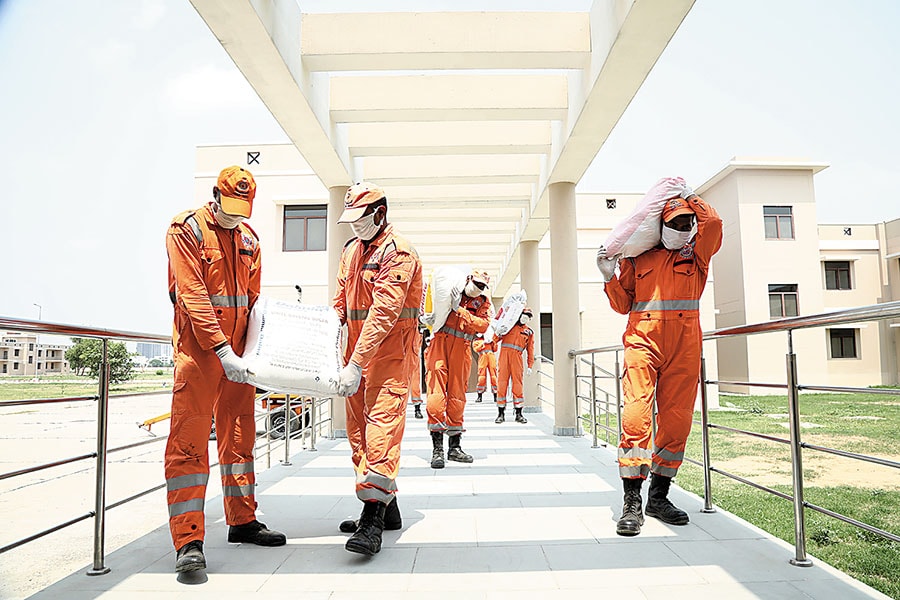 Along with the NDRF, Khanna has distributed 27 million meals across the country
Along with the NDRF, Khanna has distributed 27 million meals across the country
Photo Courtesy: Team Chef Vikas Khanna[br]
The very next day, he put together a team in the US and spent hours shuffling Excel sheets to coordinate relief work in India. He tied up with government agencies like the NDRF to reach food to areas where common men would be hard pressed to venture. “I would tell them where to collect, say, 400 kg rice, and where to add the dal, and they would take the responsibility of distributing them from point A to point B,” he says. Natural calamities like the cyclone Amphan in West Bengal washed away his stocks, but a resilient Khanna immediately arranged for a top-up.
“The campaign was his, we lent the support. The partnership with Khanna worked well because he was consistent, persistent, and passionate. That passion wore on to us, got our personnel enthused because he was doing fabulous work,” says Satya Narayan Pradhan, the director general of NDRF. The tie-up helped Khanna expand his reach to, for example, Shramik Special trains. “No NGO would have been able to get the necessary permissions to hold up trains to distribute food. That’s the USP we brought to this partnership and Khanna was thrilled with it,” adds Pradhan. In four and a half months, beginning April, the initiative has distributed more than 27 million meals across the country, and earned a book deal.
“Khanna is a passionate man,” says actor Neena Gupta. “For The Last Color, he had a small unit and would do everything by himself. If he wanted saris and dhotis on the Benaras ghats in the background, he would go and tie them himself. He hardly eats when he gets to work. I had asked his mother to stay back for the shoot so that she could make sure he would eat and sleep.”
But intense passion doesn’t make Khanna obstinate. Kumar, his second-in-command at Ellora, remembers the time they were looking to add a crust to the dahi kebab at Kinara. Despite his apprehensions, Khanna gave a go-ahead to Kumar’s suggestions of kunafa, a delicate Middle Eastern shredded pastry. Gupta too recalls Khanna’s child-like excitement at her idea of dropping the dialogue in a scene and using silence to convey a surge of emotions. “He started jumping at my suggestion. He cooks beautiful food, makes beautiful films, and is an equally beautiful person,” she says.

By mid-August, Khanna hasn’t slept well for over 100 days. And even as he speaks to us for nearly an hour, he has follow-up tasks lined up, “I have more than 20 missed calls from the NDRF.” How does he manage to motor on day after day? “Zid [obstinacy],” he says. “If I start something, I let it go only after I have perfected it. And also make an impact. If something that I do manages to move the needle, I will continue to be at it.”
By his own admission, he never meant to make a feature film, and The Last Color happened only because the doctors had advised him to stay away from the kitchen for three months due to an injury. He never planned on a second film till July 14 last year, when his first received a standing ovation after being screened at the UN headquarters, bringing to light the plight of widows in Vrindavan. “When the audience stood up and clapped, something moved in me. If those 90 minutes could influence the movers and shakers of the world, I thought I should be able to use my position and bring forth pressing issues,” says Khanna.
When Khanna was born with a club foot, a condition of misaligned feet, many doubted if he would ever be able to walk properly. Says his mother, “Ab woh chal nahi, udd raha hai [now he isn’t walking, he’s flying].”
First Published: Aug 29, 2020, 07:07
Subscribe Now